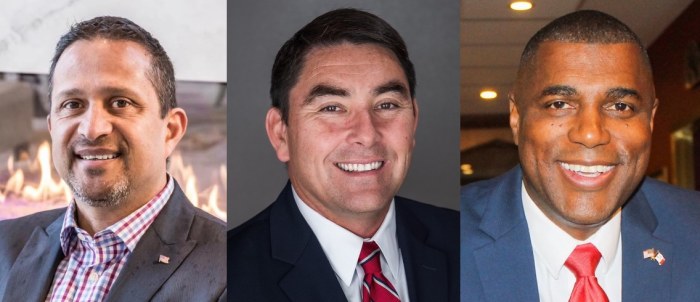Fourth in a series interpreting the results of Iowa’s 2020 state and federal elections.
More people of color than ever ran for the Iowa House in 2020. As a result, a more diverse group of state representatives will be sworn in next year.
Not only will the state House have a record number of members who are not white, people of color serving in the Iowa legislature will include some Republicans for the first time since the 1960s.
The five African Americans who have served in the legislature since 2019 won re-election on November 3: Democrats Ako Abdul-Samad (House district 35), Ruth Ann Gaines (House district 32), Ras Smith (House district 62), Phyllis Thede (House district 93), and Ross Wilburn (House district 46). All were unopposed other than Thede, and Republicans spent little supporting her challenger.
FIRST LATINO LEGISLATOR ELECTED
Latinos make up about 6.3 percent of Iowa’s population. They have never been represented in the state legislature up to now, despite quite a few candidacies (mostly Democrats) during the past decade.
Republican Mark Cisneros will make history when he takes office in January. The business owner and truck driver won the open seat in House district 91 with just under 57 percent of the vote following an expensive campaign. That district includes the city of Muscatine and some other areas in Muscatine County. According to the Latinos in Iowa: 2020 report, about 18.3 percent of that county’s residents are Latinos, which ranks fourth among the 99 counties (the top three for Latinos as a share of the population are Crawford, Buena Vista, and Marshall). To my knowledge, Muscatine is the only Iowa county to have elected a Latino supervisor (Santos Saucedo).
A spokesperson for Cisneros declined Bleeding Heartland’s interview request following the election. Asked whether the winning candidate had any comment on being the first Latino elected to the Iowa legislature, the spokesperson said, “Mark does not see this election as a decision voters made on the basis of ethnic heritage, but rather on the merits of his platform, conservative values, and community involvement.”
I hadn’t suggested that Muscatine voters chose Cisneros because of his ethnicity–only that his election is a milestone for diversity in Iowa politics.
ASIAN-AMERICAN TO SERVE AFTER LONG GAP IN REPRESENTATION
Asian Americans make up about 2.7 percent of Iowa’s population. The only person of Asian descent ever to serve in the Iowa legislature was Democrat Swati Dandekar, first elected to the state House in 2002 and to the Iowa Senate in 2008.
Henry Stone, an Air Force veteran and sales consultant, won an open seat race in House district 7, covering Emmet and Winnebago counties and part of Kossuth County. This strongly Republican district wasn’t targeted by either party, and Stone was unopposed in the GOP primary.
Speaking to Bleeding Heartland over the summer, Stone described himself as Amer-Asian, meaning half Caucasian and half Asian. He did not respond to messages after the election seeking comment on the significance of his win.
Ben Jung, who chairs the Commission of Asian and Pacific Islander Affairs in the Iowa Department of Human Rights, told Bleeding Heartland on November 9 that it’s “always a good thing” to have Iowa’s increasingly diverse population represented in the legislature. He added that Stone’s election is “a good sign of progress, even if it’s taken a while” since Dandekar served. (She resigned her Senate seat in 2011.)
The Department of Human Rights doesn’t endorse candidates for any office, but the agency’s public information officer Sonya Streit told Bleeding Heartland on November 9 that “there is value in having diversity in the legislature.”
NEWCOMER TO BE IOWA’S SECOND BLACK REPUBLICAN LAWMAKER
African Americans make up about 4.1 percent of the state’s population. The high water mark for Black representation in the Iowa House was six members in 2009 and 2010. That number dropped to five in 2011 and to four in 2019, following Helen Miller’s retirement. Then Wilburn brought the number back to five by winning an August 2019 special election. He had long been inspired by Willie Stevenson Glanton, the first Black Iowan to serve in the state House.
Before 2020, Iowans had elected eighteen African-American state lawmakers. All but one served in the House, and all but one were Democrats.
Eddie Andrews, an entrepreneur and pastor, narrowly defeated Democratic incumbent Karin Derry in House district 39 last week. He will be Iowa’s second Black Republican lawmaker, after Cecil Reed, who served a term in the House in 1967 and 1968.
Andrews did not respond to messages seeking comment on his win and whether he will join the Iowa Legislative Black Caucus, a nonpartisan group formed in 2019. The candidate’s wife, Betty Andrews, is president of the NAACP’s Iowa-Nebraska conference.
To sum up: eight people of color (five Democrats, three Republicans) will serve in the Iowa House for the next two years, breaking the record of six people of color who served in the chamber during part of the 2000s.
Final note: every one of Iowa’s 50 state senators for the next two years will be white, which has been the case since Dandekar stepped down in 2011. All Democratic and Republican nominees for the Senate in 2020 were white as well. ToyA Johnson, who is African American, ran as a Libertarian in Senate district 16, where the GOP didn’t field a candidate.
Top image: Facebook profile pictures of Mark Cisneros (left), Henry Stone (center), and Eddie Andrews (right).

